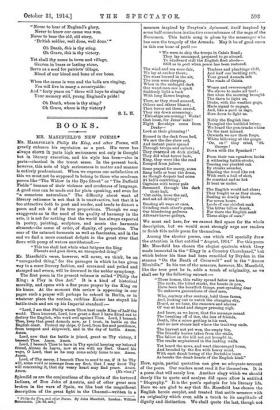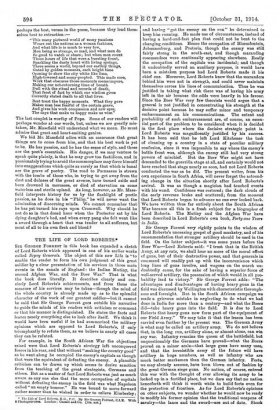BOOKS.
MR. MASEFIELD'S NEW POEMS"
MR. MASEFIELD'S Philip the King, and other Poems, will greatly enhance his reputation as a poet. His verse has always shown in parts high seriousness not only in thought but in literary execution, and his style has been—also in parts—classical in the truest sense. In the present book, however, this note of high seriousness in matter and manner is entirely predominant. When we express our satisfaction at this we must not be supposed to belong to those who condemn poems like "The Widow in the Bye Street" or "The Daffodil
Fields" because of their violence and crudeness of language. A good case can be made out for plain speaking, and even for "a conscious naturalism." The difficulty about want of literary reticence is not that it is unattractive, but that it is too attractive both to poet and reader, and tends to distort a
poem and rob it of its true proportions. Though we may exaggerate as to the need of the quality of harmony in the arts, it is not for nothing that the world has always expected in poetry, painting, sculpture, and music the harmonic element—the sense of order, of dignity, of proportion. The roar of the cataract torments as well as fascinates, and in the end we find a more constant delight in the great river that flows with pomp of waters unwith stood :—
"This too shall last while what fatigues the Ring Flaunts and goes down, an unregarded thing."
Mr. Masefield's verse, however, will never, we think, be an " unregarded thing," for the passages in which he has given way to a mere literary fashion, and screamed and yelled and
stamped and sworn, will be drowned in the nobler symphony. The first poem in the present volume is called "Philip the King : a Play in One Act." It is a kind of historical morality, and opens with a fine prose prayer by the King on his knees. At the moment this review is appearing in our pages such a prayer will perhaps be echoed in Berlin, or in whatever place the restless, ruthless Kaiser has stayed his battle-train and set up his Imperial standard :—
"Lord, I am that Philip whom Thou bast made King of half the world. Thou knowest, Lord, how great a fleet I have fitted out to destroy the English, who work evil against Thee. Lord, I beseech Thee, keep that great Armada now, as I trust, in battle on the English coast. Protect my ships, 0 Lord, from fire and pestilence, from tempest and shipwreck, and in the day of battle. Amen. Amen.
Lord, now that the battle is joined, grant us Thy victory, I beseech Thee. Amen. Amen.
Lord, I beseech Thee to have in Thy special keeping my beloved friend, Alonso de Leyva, now at sea with my fleet. Guard his ways, 0 Lord, that so he may come safely home to me. Amen. Amen.
Lord, of Thy mercy, I beseech Thee to send to me, if it be Thy will, some word or message from my fleet, that I may know Thy will concerning it, that my weary heart may find peace. Amen. Amen. (He rises.)"
Splendid as are the conjurations of the spirits of the tortured Indians, of Don John of Austria, and of other great men broken in the wars of Spain, we like best the magnificent description of the great fight in the Channel—written in a
• Philip the King, and other Poems. By John Masatteld. London : William ge6ne,,a,n. [341. 6d. net.]
measure inspired by Drayton's Agincourt, itself inspired by some half-conscious instinctive remembrance of the saga of the Norsemen. This battle song is given by the messenger who has seen the tragedy of the Armada. May it be of good omen in this our hour of peril :—
"We were to ship the troops in Calais Road; They lay encamped, prepared to go aboard. To windward still the English fleet abode— Still as in port when peace has been restored.
Timbers and plankings cleft, And half our tackling ref t, Your grand Armada left The roads of Calais.
Weary and overwrought We strove to make all taut : But when the morning brought The dawn to light us, Drake, with the weather gage, Made signal to engage, And, like a pard in rage, Bore down to fight us.
Nobly the English line Trampled the bubbled brine; We heard the gun-trucks whine To the taut laniard.
Onwards we saw them forge, White billowing at the gorge. 'On, on !' they cried,
George !
Down with the Spaniard !'
From their van squadron broke A withering battle-stroke, Tearing our planked oak By straiks asunder,
Blasting the wood like rot With such a hail of shot, So constant and so hot It beat us under.
The English would not close; They fought us as they chose, Dealing us deadly blows For seven hours.
Lords of our chiefest rank The bitter billow drank, For there the English sank Three ships of ours."
We must end here, for we cannot find space for the whole description, but we would most strongly urge our readers to finish this noble poem for themselves.
Among the shorter poems, one which will specially draw the attention is that entitled "August, 1914." For this poem Mr. Masefield has chosen the elegiac quatrain which Gray made immortal in the "Elegy in a Country Churchyard," but which before his time had been ennobled by Dryden in the stanzas "On the Death of Cromwell" and in the " Annus M.irabilis." In his use of the measure, however, Mr. Masefield, like the true poet he is, adds a touch of originality, as we shall see by the following extract :—
" These homes, this valley spread below me here, The rooks, the tilted stacks, the beasts in pen, Have been the heartfelt things, peat-speaking dear To unknown generations of dead men, Who, century after century, hold these farms, And, looking out to watch the changing sky, Heard, as we hear, the rumours and alarms Of war at hand and danger pressing nigh.
And knew, as we know, that the message meant The breaking off of ties, the loss of friends, Death, like a miser getting in his rent, And no new stones laid where the trackway ends.
The harvest not yet won, the empty bin, The friendly horses taken from the stalls, The fallow on the hill not yet brought in, The cracks unplastered in the leaking walls.
Yet heard the news, and went discouraged home, And brooded by the fire with heavy mind, With such dumb loving of tho Berkshire loam As breaks the dumb hearts of the English kind."
Here, again, partial quotation can give no adequate account of the poem. Our readers must read it for themselves. It is
a poem that will surely live. Another elegy which we should dearly like to quote and analyse did space allow is entitled "Biography." It is the poet's apologia for his literary life. Here we are glad to say that Mr. Masefield has chosen the English heroic couplet, and treated that noble measure with an originality which even adds a touch to its amplitude of
dignity and distinction. We shall quote the last, though not
The wind and sea were fair, We lay at anchor there ; The stars burned in tho air, The men were sleeping, When in the midnight dark Our watchman saw a spark Suddenly light a bark With long flames leaping.
Then, as they stood amazed, Others and others blazed ; Then terror set them crazed, They ran down screaming : 'Fire-ships are coming ! Wake ! Cast loose, for Jesus' sake ! Eight fire-ships come from Drake—
Look at their gleaming !'
Roused in the dark from bed, We saw the fire show red, And instant panic spread Through troops and sailors ; They swarmed on deck unclad, They did what terror bade, King, they were like the mad Escaped from jailers.
Some prayed for mercy, some Rang bells or beat the drum, As though despair had come At hell's contriving;
Captains with terror pale Screamed through the dark their hail, 'Cut cable, loose the sail, And set all driving!'
Heading all ways at once, Grinding each other's guns, Our blundering galleons Athwart-hawse galleys,
perhaps the best, verses in the poem, because they lend them- selves best to extraction :-
"This many pictured world of many passions Wears out the nations as a woman fashions, And what life is is much to very few,
Mon being so strange, so mad, and what men do So good to watch or share ; but when men count Those hours of life that were a bursting fount, Sparkling the dusty heart with living springs, There seems a world, beyond our earthly things, Gated by golden moments, each bright time Opening to show the city white like lime, High-towered and many-peopled. This made sure, Work that obscures those moments seems impure, Making our not-returning time of breath Dull with the ritual and records of death, That frost of fact by which our wisdom gives Correctly stated death to all that lives.
Best trust the happy moments. What they gave Makes man less fearful of the certain grave, And gives his work compassion and new eyes, The days that make us happy make us wise."
The last couplet is worthy of Pope. Some of our readers will perhaps wonder at our words, but, unless we are greatly mis- taken, Mr. Masefield will understand what we mean. He must admire that great and heart-smiting genius.
We bid Mr. Masefield adieu with an assurance that great things are to come from him, and that his best work is yet to be. He has passion, and he has the sense of style, and these are the poet's essentials. His danger, if we may venture to speak quite plainly, is that he may grow too fastidious, and in passionately trying to avoid the commonplace may force himself into exaggerations which quite as surely as that which is banal are the grave of poetry. The road to Parnassus is strewn with the tombs of those who, in trying to get away from the dust and dulness of the great avenue, have turned aside and been drowned in morasses, or died of starvation on some waterless and sterile upland. As long, however, as Mr. Mase- field interprets history for us by the flashlight of poetic passion, as he does in his "Philip," he will never want the admiration of discerning minds. We cannot remember that he has yet turned his rays upon Cromwell. Why should he not do so in that dread hour when the Protector sat by his dying daughter's bed, and when every pang she felt went like a sword through a heart that was tender to all sufferers, but most of all to his own flesh and blood



































 Previous page
Previous page